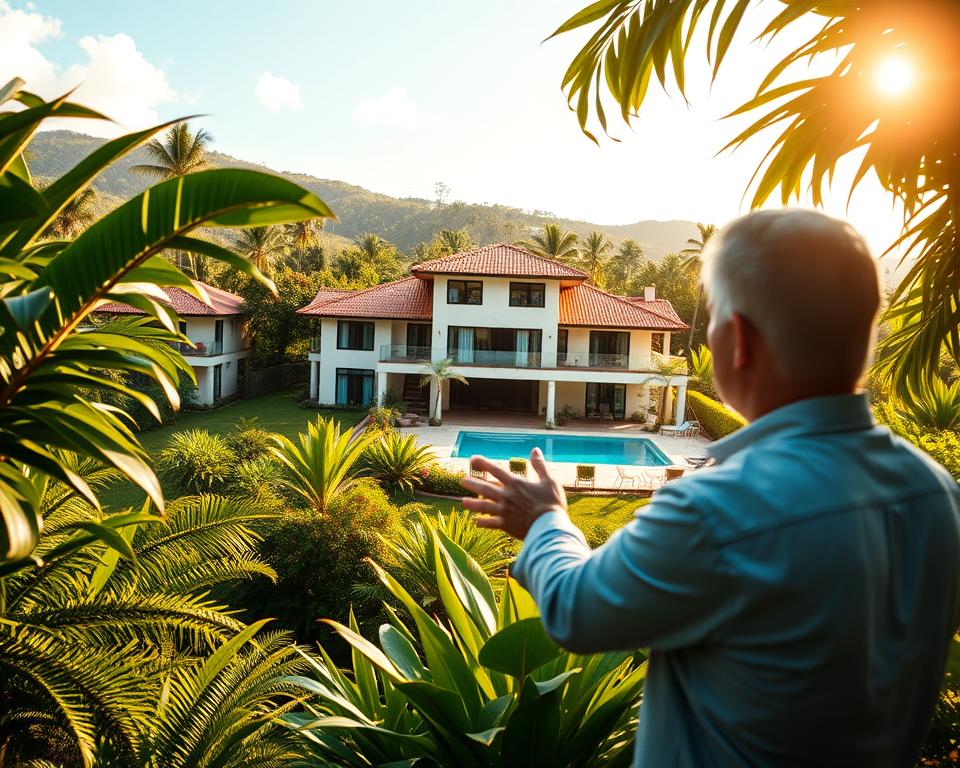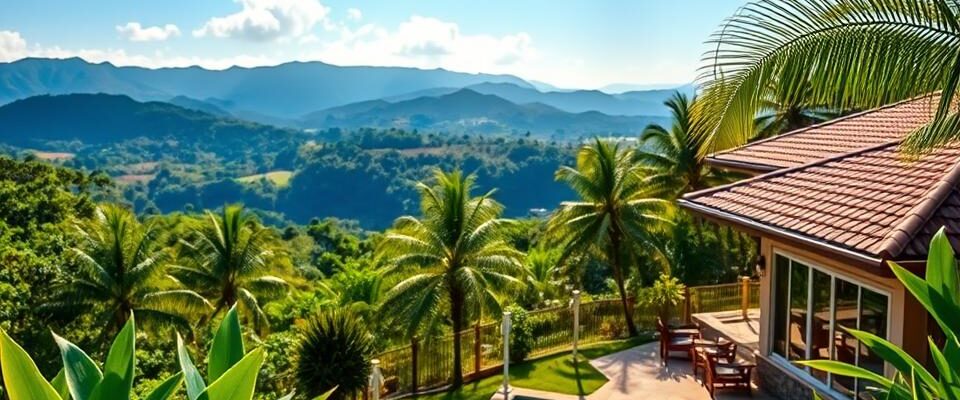Real Estate Purchase Tips in Costa Rica – Trusted Local Expertise
Buying property in a foreign country can be challenging due to differences in legal systems, cultural norms, and language. At Gap Real Estate, we simplify the process of buying, selling, or investing in Costa Rica with our 20+ years of local expertise.
Costa Rica has become a popular destination for foreign investors, with a significant increase in investment over the past three years. To navigate the property buying process successfully, it’s essential to understand the unique legal framework, market conditions, and cultural differences that impact transactions.
Our comprehensive guide will walk you through essential tips and considerations for purchasing property in Costa Rica, from market research to closing the deal. With our expert insights, you’ll be able to avoid common pitfalls and make informed decisions throughout your real estate journey.
The Costa Rican Real Estate Market: An Overview
Costa Rica’s real estate market is thriving, driven by its exceptional lifestyle offerings and strong legal protections for property owners. The country’s unique combination of natural beauty, political stability, and investor-friendly property laws makes it an attractive destination for foreign investors.
Why Costa Rica Attracts Foreign Investors
Costa Rica continues to attract foreign investors due to its diverse lifestyle options and strong legal protections for private ownership. The country’s year-round warm weather, rich biodiversity, and varied environments ranging from pristine beaches to volcanic mountains appeal to various buyer preferences. Additionally, Costa Rica is considered one of the safest places to buy property in Latin America, upheld by the government’s strong legal protections for private property, including for foreign buyers.
Current Market Trends in 2023
In 2023, the Costa Rican real estate market has experienced a normalization period following the post-pandemic surge, creating more favorable conditions for buyers with slightly decreased competition. European buyers have shown increased interest in Costa Rican properties for retirement purposes, attracted by the country’s tranquility, relative affordability compared to European markets, and high quality of life. The market is further supported by Costa Rica’s solid healthcare system, improving infrastructure, and strong rental income potential in popular tourist areas.
Legal Framework for Foreign Buyers in Costa Rica
Costa Rica offers a welcoming environment for foreign property buyers, with a legal framework that supports their investment. Foreigners can legally purchase and own property in Costa Rica with full rights, enjoying the same property ownership rights as local citizens under “fee simple” title.
Property Ownership Rights for Foreigners
Foreign buyers in Costa Rica have the same property ownership rights as locals, granting them complete control over their property. This includes the right to sell, lease, develop, or bequeath the property. Americans and other foreigners can purchase property on a tourist visa without needing residency or citizenship, making Costa Rica an attractive and accessible market.
- Equal property ownership rights as local citizens
- No requirement for residency or citizenship to buy property
- Complete control over the property, including selling, leasing, developing, or bequeathing
Maritime Zone Regulations
Maritime Zone regulations in Costa Rica create exceptions to standard ownership rules. The first 50 meters from high tide are considered public land, and the next 150 meters have restrictions. Foreigners buying property in these restricted zones must establish a Costa Rican corporation, typically a Sociedad Anónima or Sociedad de Responsabilidad Limitada, with at least 51% Costa Rican ownership.
- Restrictions apply within 200 meters of the high tide line
- Foreigners must form a Costa Rican corporation to buy in restricted zones
- Approximately 5% of Costa Rica’s beaches have titled land up to the 50-meter line, offering unique investment opportunities

Types of Properties Available in Costa Rica
Costa Rica is renowned for its diverse range of properties that cater to various lifestyles and investment goals. The country’s varied landscapes, from beaches to mountains, offer a broad spectrum of real estate options for buyers.
Beachfront and Ocean View Properties
Beachfront and ocean view properties in Costa Rica are highly sought after, particularly in tourist hubs like Samara. These properties not only offer a picturesque setting but also have strong potential for generating rental income. We find that beachfront properties are a popular choice among investors looking for a lucrative opportunity in the real estate market.
Mountain and Jungle Estates
For those seeking tranquility and a connection with nature, mountain and jungle estates in Costa Rica provide an ideal solution. These properties offer cooler climates and opportunities for eco-friendly development, appealing to buyers interested in sustainable living options. The land in these areas can be used for various purposes, including agricultural use or conservation projects.
Urban and Suburban Developments
Urban and suburban developments, especially around San José, offer modern amenities and infrastructure. Properties in these areas range from contemporary condos to single-family homes in gated communities, catering to a variety of lifestyle preferences. When investing in a home in these developments, buyers should consider factors like proximity to amenities and the quality of local infrastructure.
In summary, Costa Rica’s real estate market offers a diverse range of properties, including beachfront, mountain, and urban developments. This diversity allows buyers to choose a property that matches their lifestyle and investment objectives.
Essential Real Estate Purchase Tips in Costa Rica
To ensure a successful real estate transaction in Costa Rica, it’s crucial to be well-informed. The country’s real estate market is diverse, with opportunities ranging from beachfront properties to mountain estates. However, navigating this market requires a clear understanding of the key steps involved in purchasing property.
Working with a Reputable Real Estate Agent
Working with a reputable real estate agent is crucial in Costa Rica, as there is no centralized MLS system. When selecting an agent, verify they are registered with the Costa Rican Financial Superintendency (SUGEF) and licensed by a major real estate association such as CRGAR. This ensures they adhere to ethical standards and have the necessary local expertise.
Conducting Thorough Due Diligence
Conducting thorough due diligence is non-negotiable when buying property in Costa Rica. This process should include comprehensive title searches, verification of property boundaries, checking for liens or encumbrances, and confirming zoning regulations. By doing so, buyers can avoid potential legal issues and ensure their investment is secure.
Understanding the True Cost of Ownership
Understanding the true cost of ownership goes beyond the purchase price to include closing costs, property taxes, maintenance expenses, and potentially homeowners association fees. Buyers should also consider visiting properties in person to assess the land, surroundings, and neighborhood atmosphere accurately.
The Step-by-Step Buying Process
When purchasing real estate in Costa Rica, it’s crucial to follow a structured buying process to ensure a smooth transaction. This process involves several key steps, from making an initial offer to closing the deal.
Making an Offer and Negotiation Strategies
The Costa Rican property buying process typically begins with identifying a property and making a written offer through your real estate agent. Negotiations follow to reach a mutually agreeable purchase price. Once terms are agreed upon, your attorney drafts a formal purchase-sale agreement.
The Due Diligence Period
After signing the purchase-sale agreement, a due diligence period ensues, usually lasting 30-60 days. During this time, your attorney verifies the property’s legal status, checks for liens or encumbrances, confirms zoning regulations, and assesses potential legal issues.
Closing the Deal
Closing involves the Notary Public drafting and registering the property transfer deed, which is then submitted to the National Registry. It’s advisable to wire funds in advance of the closing date to avoid delays in international transfers.
By understanding and following this step-by-step buying process, buyers can navigate Costa Rica’s real estate market with confidence, ensuring a successful transaction.
Financial Considerations for Property Buyers
When purchasing property in Costa Rica, it’s crucial to consider the various financial implications beyond the purchase price. Understanding these costs helps buyers make informed decisions and avoid unexpected expenses.
Closing Costs and Transfer Taxes
Closing costs in Costa Rica typically range between 3.5% to 4% of the property’s value, encompassing legal fees, transfer taxes, and registration fees. The property transfer tax, at 1.5% of the declared value, is a significant component of these costs. Buyers should budget for these expenses in advance to ensure a smooth transaction.
Financing Options for Foreign Buyers
Financing options for foreign buyers are limited in Costa Rica, with most international purchases being made in cash or through private financing arrangements. Local banks have stringent requirements for non-residents, making it challenging to secure financing. Buyers should explore alternative financing options or plan to make a cash purchase.
Property Taxes and Ongoing Expenses
Property taxes in Costa Rica are relatively low, at 0.25% of the registered property value annually. However, properties valued over $214,000 are subject to an additional luxury tax on a sliding scale. Buyers should factor these ongoing expenses into their long-term cost of ownership. For more information on Costa Rica’s real estate market and how to navigate these financial considerations, visit Gap Real Estate.
Common Pitfalls and How to Avoid Them
Navigating Costa Rica’s real estate market requires more than just a keen eye for property; it demands a thorough understanding of local regulations and potential pitfalls. While Costa Rica is considered a safe haven for property investment, there are several traps that buyers should be cautious of.
Title Issues and Property Disputes
One of the most significant risks in Costa Rican real estate transactions is title issues. A comprehensive title search is essential to verify clean ownership history and the absence of liens or encumbrances. Ensuring that the property title is clear can prevent future disputes.
Navigating Language and Cultural Differences
Language barriers can lead to serious misunderstandings, as all official documents in Costa Rica must be in Spanish. Bilingual legal representation is crucial to ensure accurate interpretation of contracts and agreements. Moreover, cultural differences in business practices can create confusion for foreign buyers.
Understanding Zoning and Building Regulations
Zoning and building regulations vary significantly across different regions of Costa Rica. Understanding these regulations is vital, especially in coastal areas, protected zones, and areas with specific environmental restrictions. Ensuring that any structures on the property are permitted and legally built is a critical part of the due diligence process.
- Verify the property title is clean and free of encumbrances.
- Ensure compliance with zoning and building regulations.
- Engage bilingual legal representation to navigate language barriers.
Why Choose Gap Real Estate as Your Trusted Partner

Navigating the intricacies of Costa Rica’s real estate market requires a knowledgeable ally, and that’s where Gap Real Estate comes in. With a deep understanding of the local market and over 20 years of coast-to-coast expertise, we simplify the process of buying, selling, or investing in Costa Rica.
20+ Years of Coast-to-Coast Expertise
Gap Real Estate brings over 20 years of coast-to-coast expertise in the Costa Rican property market, offering unparalleled local knowledge that helps buyers navigate regional differences and identify the best opportunities. Our extensive experience ensures that we can guide you through the complexities of the real estate process in Costa Rica.
Comprehensive Support Throughout the Buying Process
Our comprehensive support extends throughout the entire buying process, from initial property search to post-purchase assistance, handling everything from relocation logistics to complex legal details. With Gap Real Estate, you gain a partner who will handle the intricacies of the transaction, ensuring a smooth experience.
Client-Focused, Results-Driven Approach
We pride ourselves on a client-focused, results-driven approach that prioritizes your specific goals, whether you’re seeking a vacation home, retirement property, or strategic investment opportunity. Our team of bilingual professionals eliminates communication barriers and cultural misunderstandings, ensuring transparent transactions and clear expectations throughout the property purchase process.
At Gap Real Estate, we are committed to delivering seamless transactions through expert guidance, clear communication, and relentless dedication to your goals. With our extensive network of legal experts, property inspectors, and local service providers, we ensure a seamless transaction and smooth transition to property ownership in Costa Rica.
Conclusion
Navigating the complexities of Costa Rica’s property market requires expertise and local knowledge. To ensure a successful transaction, it’s crucial to understand the local real estate market and legal framework. Working with experienced professionals, including a reputable real estate agent and a qualified attorney, is essential.
For a seamless property purchase experience in Costa Rica, contact Gap Real Estate at www.gaprealestate.com, call/WhatsApp +(506)-4001-6413, or email [email protected]. With over two decades of coast-to-coast expertise, we guide you through every step of your Costa Rican property journey.




